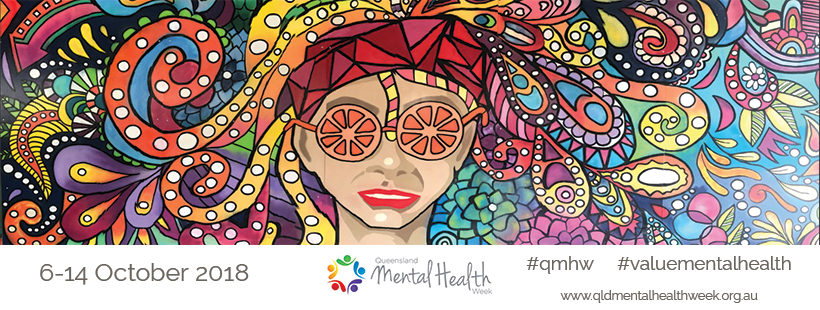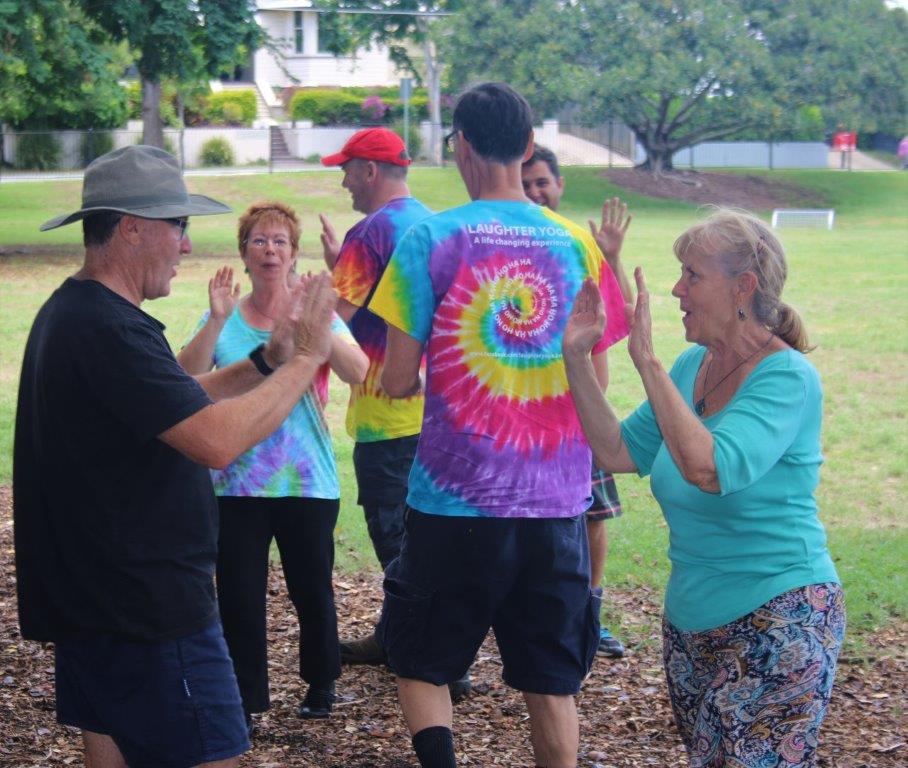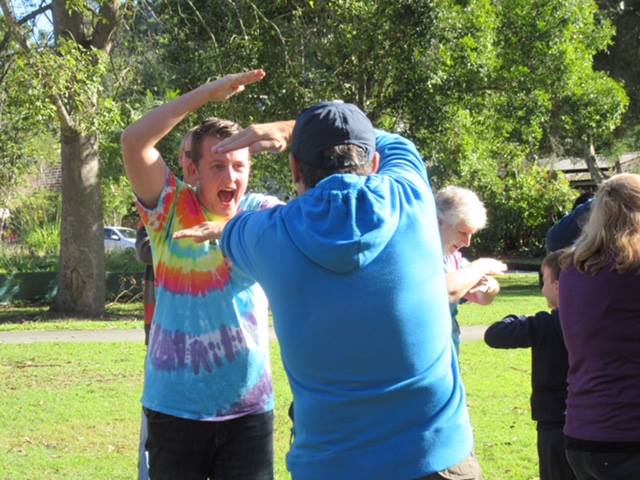
Laugh to wellbeing beyond Queensland Mental Health Week
Queensland Mental Health Week 2018—6 to 14 October—seeks to promote the importance of positive mental health and wellbeing at home, at work and at play.
I am delighted to be engaged through the coming week at a number of south-east Queensland workplace and community events, spreading wellbeing through laughter, seriously.
Queensland Mental Health Week urges participants to take 6 steps to improve their wellbeing, based on the Wheel of Wellbeing model, and laughter yoga is an accessible means of tapping into them all. Here’s how.
 1. Be active. Laughter yoga incorporates gentle stretches, deep yoga breaths and simulated laughter exercises. Combine the sustained belly laughter and the deep yogic breaths and we’re jogging on the inside. There’s much to be said for laughter yoga’s health benefits. Years ago, Dr William Fry at Stanford University revealed that 10 minutes of hearty belly laughter was the equivalent of 30 minutes on a rowing machine, not in terms of muscular movement but cardio-pulmonary endurance. The theory of motion creating emotion is evident too. Way back in the 1800, psychologist William James found that the state of mind (positive or negative) was mirrored in body behaviour. Laughter yoga uses that two-way body-mind link to change the state of mind through the combination of clapping, chanting, laughing and breathing exercises. So much for ‘not being in the mood’ to laugh!
1. Be active. Laughter yoga incorporates gentle stretches, deep yoga breaths and simulated laughter exercises. Combine the sustained belly laughter and the deep yogic breaths and we’re jogging on the inside. There’s much to be said for laughter yoga’s health benefits. Years ago, Dr William Fry at Stanford University revealed that 10 minutes of hearty belly laughter was the equivalent of 30 minutes on a rowing machine, not in terms of muscular movement but cardio-pulmonary endurance. The theory of motion creating emotion is evident too. Way back in the 1800, psychologist William James found that the state of mind (positive or negative) was mirrored in body behaviour. Laughter yoga uses that two-way body-mind link to change the state of mind through the combination of clapping, chanting, laughing and breathing exercises. So much for ‘not being in the mood’ to laugh!
2. Keep learning. Queensland Mental Health Week encourages us to embrace something new, seize opportunities and surprise ourselves. Laughter yoga teaches us to take life less seriously. How many times I have entered a room of people who swear they cannot laugh because they have nothing to laugh about – yet who leave with smiles on their faces, feeling lighter and brighter from a dose of ‘hohohahaha’.
3. Give, your time, your words, your presence. Laughter yoga encourages us to be kinder to ourselves and others in words and actions, and to be here in the moment, rather than wrestling with anxieties and fears.
 4. Connect. While laughter yoga can be practised alone or online, it is at its most powerful when done as a group activity, eyeballing one another. We humans feed off the energy emitted as a group and laughter becomes contagious. John Cleese, a man famed for his humour, has described laughter yoga as a force for democracy: “I’m struck by how laughter connects you to people. It’s almost impossible to maintain any kind of distance or any sense of social hierarchy when you’re just howling with laughter”.
4. Connect. While laughter yoga can be practised alone or online, it is at its most powerful when done as a group activity, eyeballing one another. We humans feed off the energy emitted as a group and laughter becomes contagious. John Cleese, a man famed for his humour, has described laughter yoga as a force for democracy: “I’m struck by how laughter connects you to people. It’s almost impossible to maintain any kind of distance or any sense of social hierarchy when you’re just howling with laughter”.
5. Notice. Laughter yoga is a form of mindfulness. We are encouraged to ‘notice’ the air we breathe in those lovely slow breaths and to delight in the lightness of mood and spirit that comes with the sustained laughter.
6. Care for our planet. Yes, laughter yoga even has a role to play here. We are low impact. As a global ambassador for Laughter Yoga International, I maintain we bring greater wellbeing to individuals and our communities—feeling health, happy, strong and connected—through local club development. The more neighbourhoods that have laughter clubs, the lower our travel emissions will be too! Importantly, Laughter Yoga International seeks to promote health, happiness and peace globally.
Mental Health Week is but one of 52 weeks in a year. Wellbeing through laughter yoga can be yours year-round—accessible and adaptable, for all ages and abilities.
Find out about laughter yoga’s stress busting and teambuilding workplace properties. Talk with The Happydemic’s Heather Joy Campbell.
Find out how laughter yoga can help communities withstand the knocks of weather and economics. The Happydemic’s Heather Joy Campbell travels to regional and rural communities.
Find out how you can become involved in the happydemic of laughter yoga, as a training or a participant.
(c) Heather Joy Campbell 2018
Heather Joy Campbell, founder of The Happydemic, is a certified laughter yoga teacher, global ambassador for Laughter Yoga International and professional laughter wellbeing facilitator who works in workplaces and aged care and trains people to laugh, seriously, for health without jokes.